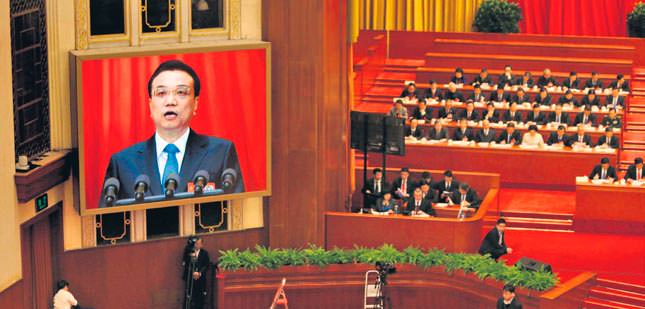China focuses on reforms and leaner, cleaner growth

China is aiming to expand its economy by 7.5 percent this year and sent the strongest signal yet that its days of chasing breakneck economic growth are over by promising to reduce the pace of investment
Compiled from wire services - China's government pledged yesterday to promote sustainable growth by opening state-dominated industries to private investment and making banks more marketoriented while keeping this year's economic expansion at a relatively robust 7.5 percent. In a State of the Union style address to an annual parliament meeting that began yesterday, Premier Li Keqiang said China is aiming to expand its economy by 7.5 percent this year, the highest level among the world's major economies, but stressed that this level of growth would not get in the way of reforms.As China's top economic official, Li said Beijing will promote consumer spending, ease exchange rate controls and improve access to credit for productive businesses. Li's pledges were in line with Communist Party plans issued in November that call for promoting market forces and domestic consumption to replace a model based on exports and investment that delivered three decades of explosive growth but has run out of steam. After 30 years of red-hot double-digit growth that has lifted millions out of poverty but also polluted the country's air and water and saddled the country with ominous debt levels, China is trying to change tack and rebalance its economy.a "We need to make sure the market plays a decisive role," said Li during his nationally televised speech to China's legislature.He promised to "break mental shackles and vested interests," a reference to possible resistance from state companies that might lose subsidies and monopolies.Idle factories will be shut, private investment will be encouraged, and work on a new environmental protection tax will be sped up to create a greener and more balanced economy powered by consumption rather than investment, Li said.Li set an official growth target of 7.5 percent. That was the same as last year but looked unusually ambitious after growth in 2013 tumbled to a two-decade low of 7.7 percent as the government cooled a lending and investment boom. That suggested Beijing is trying to reassure companies and financial markets it is ready with interest rate cuts or other steps if needed to keep growth in the world's No. 2 economy from falling too low. "Despite the painful adjustment ahead, the Chinese authorities have no plan to slow the speed," of economic expansion, said Citigroup's Minggao Shen and Ding Shuang in a report. "We sense that the government is not ready to accept growth much lower than 7.5 percent," the two economists said. They said the government would deploy stimulus measures if quarterly growth fell to 7 percent or less.Entrepreneurs and investors are watching the annual meeting of the National People's Congress for details of how President Xi Jinping and other party leaders will carry out their November pledge to give markets a "decisive role" in allocating resources. That could radically change an economy dominated by state companies that receive lowcost access to loans, energy and land.The party says its plans are the most ambitious reforms since the late supreme leader Deng Xiaoping's launch of market-oriented change in 1979 that set off China's boom.Beijing responded to an abrupt decline in growth in mid-2013 with a mini-stimulus of higher spending on railway construction but Li has said further gains have to come from longer-term restructuring. Still, despite pledges of reform, the ruling party made clear the limits of possible change in its November plan by declaring that state ownership will remain the core of the economy. Beijing has issued a flurry of minor changes such as simplifying processes for registering new businesses but has yet to take action on major tasks such as overhauling the state-run banking system.Yesterday, Li promised changes in banking and finance that reform advocates say are essential to making the economy more efficient and productive. Banks will be given more control over lending and interest rates, the premier said. That would allow profitable companies to compete for credit by paying higher rates, possibly channeling more money to entrepreneurs who generate most of China's new jobs and wealth but are mostly unable to get loans from the state-run system.It also might boost rates paid on savings, putting more money in the pockets of Chinese families and encouraging consumer spending.The premier also threw the government's support behind the growth of popular new internet-based banking services, promising to promote their "healthy development."Services such as one launched by e-commerce giant Alibaba Group have drawn billions of dollars in deposits from small savers by paying higher rates than state banks. Critics see them as a threat to a financial system that supports politically favored companies.A commentator for state television last month called them "financial parasites."The Cabinet planning agency, the National Development and Reform Commission, promised to experiment with a change sought by business groups to simplify investment by issuing a "negative list" of fields that are offlimits, leaving all others open.That would overturn a system under which investors wait for each industry or line of business to be declared open to private competition. Companies say that system fails to keep pace with changes in technology and markets. China also extended its spending spree on the world's largest armed forces, unveiling a 12.2 percent increase in the 2014 defense budget and provoking fresh concern in rival Japan and in the United States. A budget report prepared for the meeting said that "the appropriation for national defense is 808.23 billion yuan (TL 291 billion), up 12.2 percent."
